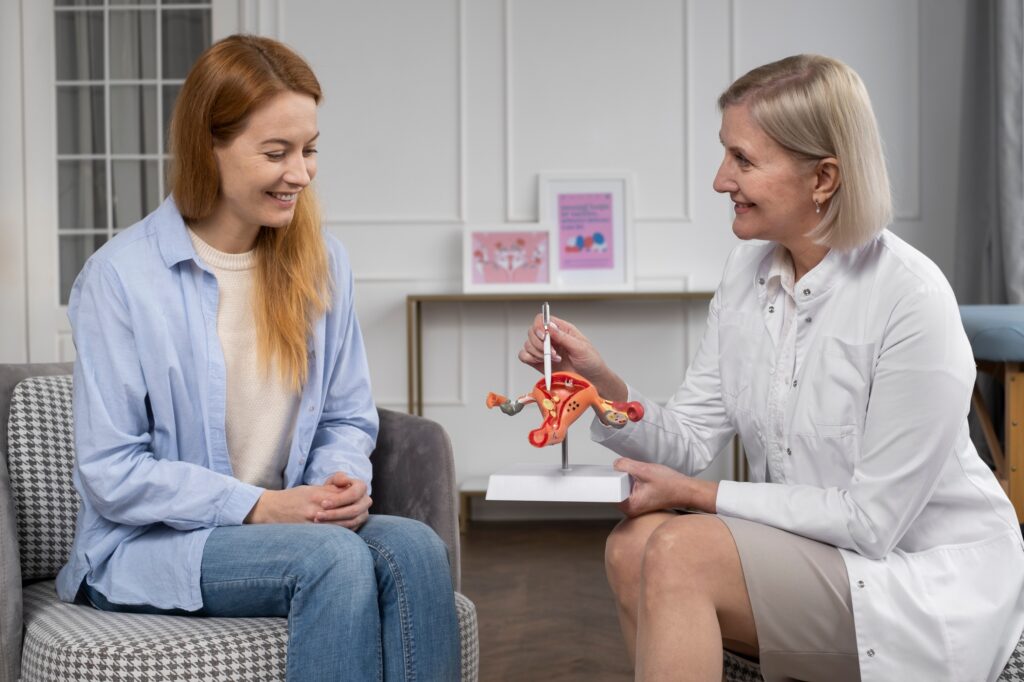Female fertility can be affected by a number of things, which may include general health and lifestyle as well as underlying medical conditions, such as endometriosis, endometrial polyps and polycystic ovarian syndrome.
Infertility can also occur without any clear cause. But if it is due to an underlying condition, you must get an accurate diagnosis.
An important point to remember is that the impact that these conditions have can vary significantly, and it is not necessary that everybody facing infertility issues will have problems conceiving.
The following are seven conditions that can affect female fertility:
Endometriosis
Endometriosis is a condition in which tissue that typically grows in the womb implants and grows outside of the uterus. The main symptoms are heavy and painful periods. There is also the possibility of the formation of endometrial cysts and scar tissue (adhesions), which possibly affects the areas within the pelvis bowels, and cervix, leading to chronic pain and abnormal bleeding.
Hormonal therapy and medication help manage bleeding and pain. Sometimes surgery may be required to remove the areas of endometriosis. The extra tissue growth and its surgical removal can cause scarring, which can block the fallopian tubes and prevent the union of egg and sperm. Implantation of the fertilized egg can also be disrupted by endometriosis. The sperm or egg can also be damaged.
Polycystic Ovarian Syndrome (PCOS)
Many women suffer from PCOS which is the most common cause of female infertility. It is a condition where the ovaries become enlarged with lots of small cysts/fluid-filled sacs. But everybody does not develop the full syndrome. The symptoms of PCOS include insulin resistance, irregular, absent or heavy periods, weight gain, acne and abnormal hair growth on the face or body, as well as mood swings and depression. It causes hormone imbalance which leads to ovulation issues. So some women with PCOS may need treatment to help stimulate ovulation, as well as IVF, in order to conceive.
Premature ovarian failure
Premature ovarian failure or premature ovarian insufficiency (POI), means loss of ovarian function before the age of 40. It is usually caused by an autoimmune response or by premature loss of eggs from the ovary, either due to genetics or chemotherapy. Though it is often linked with early menopause, that is not always the case. Infrequent or absent periods, hot flushes and disrupted sleep, plus mood, energy and libido changes are the symptoms that are typically associated with menopause. But tests to measure hormone levels are needed to confirm the diagnosis.
Hormone replacement therapy (HRT) and oral contraceptive treatment are the ways to manage premature ovarian failure. They help to minimize symptoms and risk factors linked to reduced estrogen, such as an increased risk of osteoporosis. Although some women with POI are still able to conceive, many will need fertility treatment.
Goodwill IVF, the best IVF Center in Malappuram, with experienced doctors, state-of-the-art technology and a best-in-class laboratory offers the best treatment for all female infertility problems, including IVF treatment at high success rates. The IVF Cost in Kerala is highly affordable and Goodwill takes care to help you realize your parenthood dreams within your means.
Fibroids
Fibroids, which are very common, are benign growths that develop within the muscle of the uterus. Though they are generally not problem-causing, some can block fallopian tubes or interfere with implantation, affecting fertility. It is the location and size of the fibroids that determine whether they would hinder conception or not.
Polyps
Polyps, much like fibroids are growths that can develop in the uterine lining, and also the cervix and fallopian tubes. Cervical polyps show signs and symptoms such as heavy periods, bleeding between periods and/or after intercourse, and sometimes pain. The location and size of polyps decide whether they will cause infertility or not. Surgery may be required to remove them.
Damaged or blocked fallopian tubes
Blockage or damage of fallopian tubes may keep sperm from getting to the egg or prevent the fertilized egg from reaching the uterus, resulting in trouble conceiving. However, there is a probability of conceiving in some cases, but the fertilized egg may get stuck in the fallopian tube, causing an ectopic pregnancy.
Fallopian tube damage can be caused by:
Pelvic inflammatory disease (PID), is an infection of the uterus and fallopian tubes due to chlamydia, gonorrhoea, or other sexually transmitted infections.
Scar tissue from endometriosis
Previous abdominal or pelvic surgery, in which a fertilized egg implants and develops in a fallopian tube.
It can be resolved by surgery in some cases, but some women may need further fertility treatment too.
Thyroid disorders
An under or overactive thyroid can affect female fertility too. Symptoms include fatigue, skin, hair, weight and mood changes, joint and muscle pain and very heavy or light periods that surface very slowly and are very vague. But it is important to get an accurate diagnosis and treatment.
If managed right, most women with thyroid problems are able to have a healthy pregnancy, but some may need a fertility treatment


